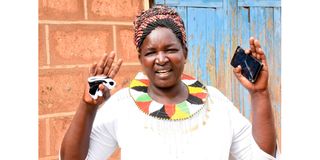Elizabeth Ibrahim, the woman taking the mantle to lead

Elizabeth Ibrahim is the vice-chairperson of Isiolo Voice of Women Network, which has birthed the Burat Citizen Forum, a shadow Parliament with 80 members.
What you need to know:
- Elizabeth Ibrahim is the Isiolo North Maendeleo ya Wanawake chairperson, a position she uses to mobilise women to get into table banking.
- She also serves as the vice-chairperson of Isiolo Voice of Women Network, which has birthed the Burat Citizen Forum, a shadow Parliament with 80 members.
Roxanne Dunbar, a social justice activist once said: "More and more women are realising that only collective strength and action will allow us to be free to fight for the kind of society that meets basic human needs."
That ideology well befits Elizabeth Ibrahim, a resolute defender of women rights, which are ostensibly human rights, and a commendable peace mediator.
Ms Ibrahim is the Isiolo North Maendeleo ya Wanawake chairperson, a position she uses to mobilise women to get into table banking to build up their financial resources and become economically independent.
Shadow parliament
“I tell women you must be economically empowered to have a voice that never goes quiet,” she says.
She also serves as the vice-chairperson of Isiolo Voice of Women Network, which has birthed the Burat Citizen Forum, a shadow Parliament with 80 members.
From 2019 when the forum was formed up to March 2020, they held their sittings monthly. The schedule was, however, changed to quarterly due to the Covid-19 disruptions.
In the sittings, the members drawn from the Burat Ward villages highlight development concerns in their zones which yield into memoranda. They are then presented to respective departments in Isiolo county government for action.
Their unity to action has yielded fruits. Ms Ibrahim says they petitioned the health department to have the APU dispensary in Burat upgraded to a health centre with enhanced health services.
Sensitisation drives
“It heeded our voice. Now, APU is a health centre with 17 health professionals and operates 24 hours,” she says. The upgrading happened five months ago, she says.
The locals have also become more aware of their role in participatory budgetary process owing to their continuous sensitisation drives in the villages.
“The people can now question why their proposed projects were not considered in the budgets and seek questions on why they were not involved in an ongoing project,” she says.
Their petition to the road department also resulted in the construction of Kampi ya Sheik Kakili Road, she says.
“Our achievements have made us realise that when women speak in one voice, leaders and government listen and take the necessary action,” she asserts.
Away from local development, Ms Ibrahim has been central to bringing peace to warring communities in North-eastern Kenya.
She was among the peace mediators that yielded the Modogashe Declaration in 2011 in which leaders from counties of Marsabit, Isiolo, Mandera, Wajir, Garissa, Tana River, Samburu and Meru agreed to end inter-community conflicts.
Progressive development
The conflicts mainly arose from unauthorised grazing and stock theft, whose effects lead to gender-based violence that the leaders from the counties agreed to unanimously resolve.
Her work has also been recognised at the national level. In 2005 under the Mwai Kibaki administration, she received the Head of State’s Commendation for her commitment in promoting Kenya’s progressive development.
“I encourage my fellow women to take the initiative to lead from whichever space they are in. But leadership is a commitment, once you start the journey, you must finish it,” she says.





